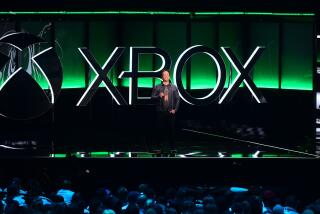Microsoft Executive Denies Plan to Split the Browser Market
- Share via
WASHINGTON — A Microsoft Corp. executive who helped set up a controversial meeting with archrival Netscape Communications Corp. in 1995 disputed claims that his company proposed to divide the Internet software market with Netscape.
In Microsoft’s most detailed account yet of the June 1995 meeting, Microsoft manager Daniel Rosen sharply contested Netscape Chief Executive James Barksdale’s testimony earlier in the government’s antitrust trial that Microsoft proposed to illegally divide the market between Netscape’s Web browser and Microsoft’s. Rosen said Barksdale’s claims reflect “either his technical ignorance or a deliberate mischaracterization of the facts.”
In 90 pages of written testimony released Wednesday, Rosen went on to portray the meeting as uneventful. Rosen said it was mostly devoted to a technical discussion of ways to improve software compatibility.
Rosen also noted that Netscape and Microsoft remained on cordial terms for months after the meeting, pursuing cooperative ventures related to improving the operation of Netscape’s browser in Microsoft’s Windows operating system.
“In numerous meetings, e-mails and phone calls, Netscape and Microsoft jointly explored, and Netscape actively encouraged, a strategic relationship between the two companies,’ Rosen testified. “There was no attempt to ‘divide markets’ at the June 21, 1995, meeting with Netscape, nor were there any threats directed at Netscape.”
The disputed meeting has been the focus of one of the most sensational allegations in the 15 weeks of the trial: The Justice Department, 19 states and the District of Columbia contend that during the meeting, Microsoft executives made overtures to team up with Netscape as part of a proposed scheme to divide the market for Internet software.
Both the government and Microsoft agree no such plan was ever implemented. But the government has sought to portray the meeting as evidence of Microsoft’s alleged anti-competitive conduct.
If the government convinces U.S. District Judge Thomas Penfield Jackson of its version of events, the judge could rule that the meeting itself amounted to an antitrust violation.
Rosen’s testimony was released as government lawyers Wednesday began questioning a top executive of Compaq Computer Corp., a staunch Microsoft supporter. Lead government lawyer David Boies got Senior Vice President John Rose to admit that Compaq’s support of Microsoft may be more compulsory than voluntary.
Rose admitted on the stand that his company has no “viable alternative” operating system to offer its customers than Microsoft’s Windows. He said that other than a tiny fraction of PCs that use some version of Unix for demanding business applications, about 90% of all Compaq PCs are sold with Windows pre-installed.
Rose also acknowledged under questioning that Microsoft was able to raise its Windows licensing fees to Compaq last year at a time when the prices of most other computer components were falling.
Under federal antitrust guidelines, a key test of whether a company is a monopoly is whether it can significantly raise prices without losing business.
Although Rose disputed Boies’ characterization of Microsoft’s price increase as “substantial,” Boies confronted Rose with a Nov. 10, 1998, Compaq “Internal Term Sheet” which allegedly outlined the company’s license negotiating stance with Microsoft.
The court exhibit was not publicly released. But Boies read aloud in court a line from the document: “In the past, Microsoft’s [personal computer manufacturer] business terms are indicative of what one would expect from a monopoly.”
Later, after the courtroom was briefly closed to the public, Boies posed a rhetorical question to Rose.
“Compaq is not, as a result of the increase, evaluating other operating systems for installation on personal computers, is it?”
“That is correct,” Rose replied.




